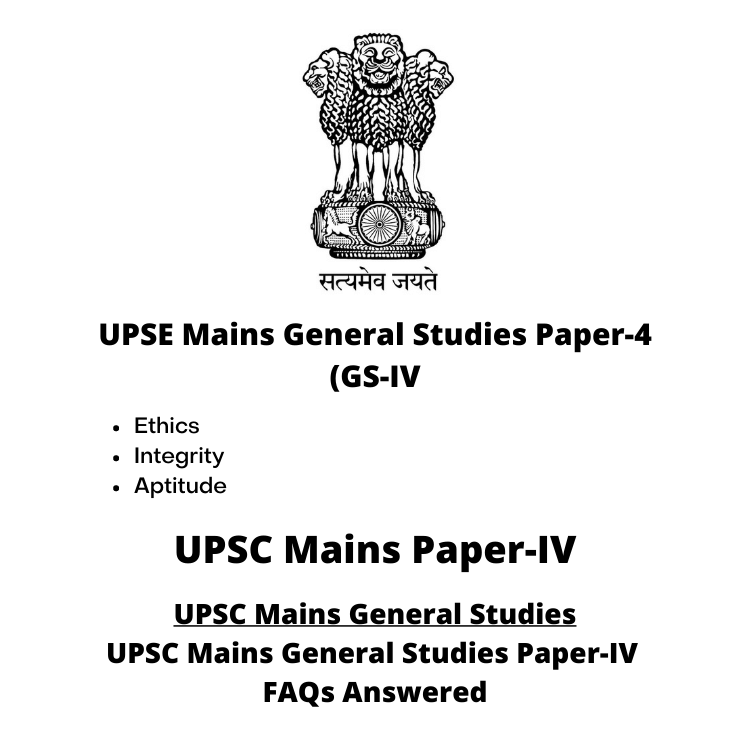UPSE Mains General Studies Paper-4 (GS-IV) is one of the nine papers of Mains Examination of the IAS examinations. It consists of the below major areas:
- Ethics
- Integrity
- Aptitude
These areas test the candidates’ attitude and approach to issues relating to integrity, probity in public life and his problem-solving approach to various issues and conflicts faced by him in dealing with society. This paper may also have a slight overlap of topics with Governance and Social Justice Subjects from UPSE Main General Studies-II but is largely independent of the syllabus of other GS papers.
GS 4 Structure
The following are the important features of the UPSC Mains General Studies Paper-IV – Structure/ General Studies IV paper:
- The paper consists of twelve questions with these divided into two sections. Before 2018, there were fourteen questions, though now the complexity has been increased and the number of questions has been reduced.
- All the questions are compulsory.
- The questions are of 10 marks and 20 marks depending on the length of the answer required. The 10 marks questions need answers within 150 words while the 20 marks questions need answers within 250 words.
- The total marks allotted to this paper are 250 marks.
- The questions are of two types:
- Direct concept related questions which test the candidate’s understanding of ethical issues and concepts related to integrity and aptitude (125 marks)
- Case studies which test the candidate’s application of those concepts to situations involving the candidate and other stakeholders such as politicians, pressure groups, the public and other people (125 marks)
- This paper is the most variable of the four General Studies Papers and the nature of questions differ widely from year to year. Candidates should familiarise themselves with the syllabus, and the last few year’s patterns as well.
UPSC Mains General Studies Paper-IV Ethics Syllabus:
| Topic | Detail |
| Ethics and Human Interface | Aspirants should learn:
Subtopics:
|
| Human Values | Aspirants should focus on:
Subtopics
Note:
|
| Attitude | Candidates should focus on Attitude:
Subtopics
Note: Question may be asked either in Part 1 or Part 2 i.e., either in theory or case study. |
| Aptitude | Important list of words that a candidate should embed in their answer in order to enhance their answer and score high:
Integrity: not compromising on anything if someone offers your bribe will you compromise Impartiality: Don’t show nepotism either for political parties or common man Non-partisanship: no biases for different political parties Objectivity: be neutral Dedication to public service Empathy Tolerance Compassion towards weaker section Subtopics:
Note: Candidates can refer to the ‘Ethics in Governance’ to cover this area as it gives a clear definition of the last five words or concepts including Nolan Committee Recommendations. |
| Emotional Intelligence | Here as an administrator, one has to follow the three procedures of Emotional Intelligence and they are:
-Understand your emotions and control them -Understand others emotion and control them -Then, act according to solve the issue genuinely and effectively Subtopics:
Note: Questions may be asked in both Part 1 and Part 2 |
| Ethical issues in international relations |
Note: Questions may be asked Part 2 i.e., case study |
| Sharing and transparency in government, Right to information, codes of ethics, codes of conduct | Candidates can refer to CCS, 1964 – The Central Civil Services (Conduct) Rules, 1964, which is of 300-400 pages
Subtopics:
|
| Citizen’s Charters, Work Culture, Quality of Service delivery, utilization of public funds, challenges of corruption |
Subtopics:
|
The major takeaway from this exam is that it tests the candidate’s honesty and integrity along with their problem solving and conflict resolution skills.
This paper relies heavily on case studies which are the most scoring parts of the paper. The candidates should be able to analyse their own reactions to various situations and apply concepts dealt with in this paper on their actions and reactions to various situations while dealing with their social circle.
Also check >> SSC Syllabus 2021
